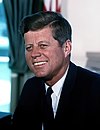Related Research Articles
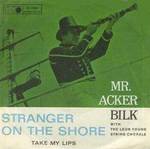
"Stranger on the Shore" is a piece for clarinet written by Acker Bilk for his young daughter and originally named "Jenny" after her. The tune was written on a single scrap of paper by Bilk and handed over to Leon Young (1916-1991) who crafted the string arrangement, including the characteristic harmonic shifts at the very end.
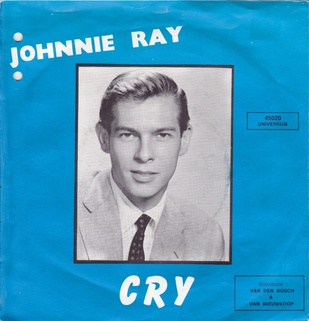
"Cry" is a 1951 popular song written by Churchill Kohlman. The song was first recorded by Ruth Casey on the Cadillac label. The biggest hit version was recorded in New York City by Johnnie Ray and The Four Lads on October 16, 1951. Singer Ronnie Dove also had a big hit with the song in 1966.
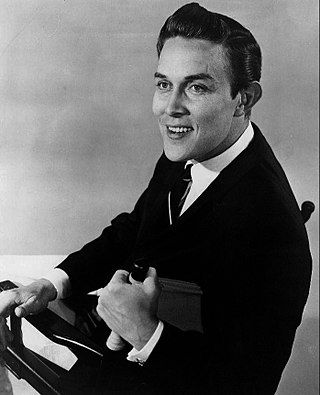
"Big Bad John" is a country song originally performed by Jimmy Dean, who wrote and composed it. It was released in September 1961 and by the beginning of November it had gone to number 1 on the Billboard Hot 100. It won Dean the 1962 Grammy Award for Best Country & Western Recording, and was nominated for the Grammy Award for Song of the Year.

"Breaking Up Is Hard to Do" is a song recorded by Neil Sedaka, co-written by Sedaka and Howard Greenfield. Sedaka recorded this song twice, in 1962 and 1975, in two significantly different arrangements, and it is considered to be his signature song. Between 1970 and 1975, it was a top-40 hit three separate times for three separate artists: Lenny Welch, The Partridge Family and Sedaka's second version.
"In the Chapel in the Moonlight" is a 1936 popular song written by Billy Hill, and first performed by Shep Fields.
"She's Got You" is a country song written by Hank Cochran and first recorded and released as a single by Patsy Cline. Musically the song is an upbeat jazz-pop song with country overtones to support it.

"Break It to Me Gently" is a pop song written by blues musician Joe Seneca with lyrics by Diane Lampert. Both Brenda Lee and Juice Newton met with considerable success with their versions of the song.
"Don't Break the Heart That Loves You" is an American song written by Benny Davis and Murray Mencher. The song was a success for two artists in two different genres: Connie Francis in the pop field in 1962 and Margo Smith as a country version in 1978.
"You're Nobody till Somebody Loves You" is a popular song written by Russ Morgan, Larry Stock, and James Cavanaugh and published in 1944. The song was first recorded by Morgan and was a hit for him in 1946, reaching the No. 14 spot in the charts. The best known version was Dean Martin's, which was released in 1960 and reissued in 1964.
"How Can I Unlove You" is the name of a No. 1 country hit by country music singer Lynn Anderson, released in 1971. "How Can I Unlove You" was written by Joe South, who had also written "(I Never Promised You a) Rose Garden". The song was produced by Anderson's husband at the time, Glenn Sutton, who had also produced "(I Never Promised You a) Rose Garden".

"Tell Me a Lie" is a song composed by Mickey Buckins and Barbara Wyrick. Originally recorded by Lynn Anderson for her 1974 What a Man My Man Is album, it was released later that same year as a single by Sami Jo Cole, who took it to number 21 on both of the major U.S. pop charts. It also charted in Canada (#17). Cole's version was also an Adult Contemporary hit, reaching number 14 in the U.S. and number 27 in Canada.
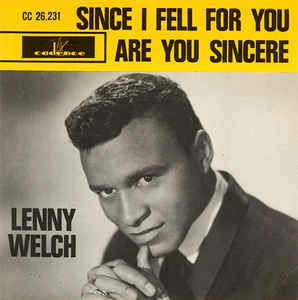
"Since I Fell for You" is a blues ballad composed by Buddy Johnson in 1945 that was first popularized by his sister, Ella Johnson, with Buddy Johnson and His Orchestra.

"Back Home Again" is a popular song written and performed by the American singer-songwriter John Denver. "Back Home Again" was released as a single from his album of the same name in 1974.

"Love or Let Me Be Lonely" is a pop song recorded by the soul group The Friends of Distinction and released as a single in early 1970. The song was a multi-format success, peaking in the top 10 of the Billboard Hot 100 at #6 on May 1, 1970 and at #13 on the R&B chart. On the Adult Contemporary singles charts, "Love or Let Me Be Lonely" went to #9. The song is ranked as the 63rd biggest hit of 1970.
"Ruby Ann" is a song written by Lee Emerson, Rashima Bellamy and Roberta Bellamy, and recorded by American country music artist Marty Robbins. It was released in October 1962. "Ruby Ann" was the number one country follow-up to "Devil Woman." "Ruby Ann" spent a single week at number one and crossed over to the pop chart peaking at number eighteen. On the Easy Listening chart "Ruby Ann" went to number four.

"Take Good Care of Her" is a 1961 song written by Arthur Kent and Ed Warren and recorded by Adam Wade. It reached number twenty on the R&B charts and number seven on the Hot 100. In the song, the narrator speaks to the groom of his ex-girlfriend.
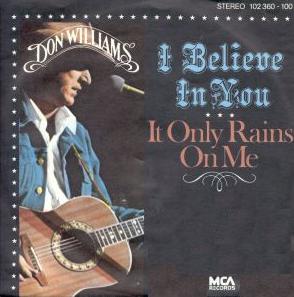
"I Believe in You" is a song written by Roger Cook and Sam Hogin, and recorded by American country music artist Don Williams. It was released in August 1980 as the first single and title track from the album I Believe in You.

"Don't Stop Believin'" is the title track from the 1976 album by Olivia Newton-John. Written and composed specifically for Newton-John by John Farrar. It was released in August 1976 as the album's lead single. It peaked at number thirty-three on the Billboard Hot 100. It was her seventh number one on the Easy Listening chart, spending one week at the top of the chart in September 1976. The single also went to number fourteen on the country chart.
"The Woman in Me" is a song written by Susan Marie Thomas, and recorded by American country music artist Crystal Gayle. It was released in October 1981 as the first single from the album Hollywood, Tennessee. The song reached number 3 on the Billboard Hot Country Singles & Tracks chart, remaining there for three weeks. "The Woman in Me" did well on Adult Contemporary chart and was a minor crossover pop hit.
"He Says the Same Things to Me" is a song written by Gary Geld and Peter Udell. It was recorded by American country artist, Skeeter Davis in 1963.
References
- ↑ Whitburn, Joel (2004). The Billboard Book of Top 40 Country Hits: 1944-2006 (2nd ed.). Record Research. p. 102.
- ↑ Whitburn, Joel (2002). Top Adult Contemporary: 1961-2001. Record Research. p. 74.
